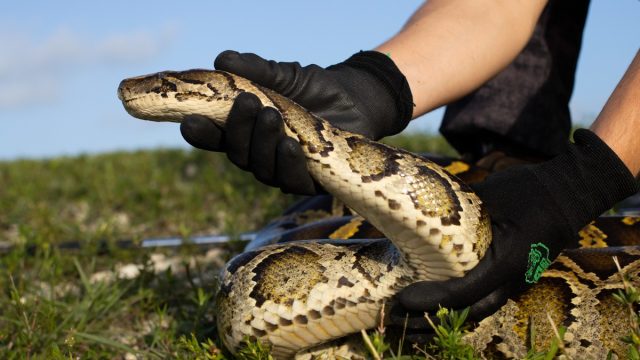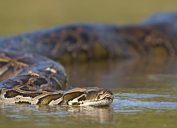209 Giant Invasive Pythons Caught in Florida But Can't Be Eradicated
The snakes were removed during the state's annual Florida Python Challenge.
Invasive species are a major problem for our ecosystems: Non-native plants and animals typically have no predators, allowing them to thrive and outcompete native species. One of these persistent invaders is the Burmese python, which is currently overwhelming South Florida—specifically within Everglades National Park. The state holds its annual Florida Python Challenge to help combat this issue, with 209 invasive pythons caught during this year's competition. But while these removal efforts aim to keep the population under control, the Burmese python will likely never be eradicated. Read on to find out more about these giant creatures we'll have to learn to live with.
RELATED: 15-Foot Invasive Pythons Are Moving North From Florida and Can't Be Stopped.
Florida holds a competition to see who can capture the most Burmese pythons.
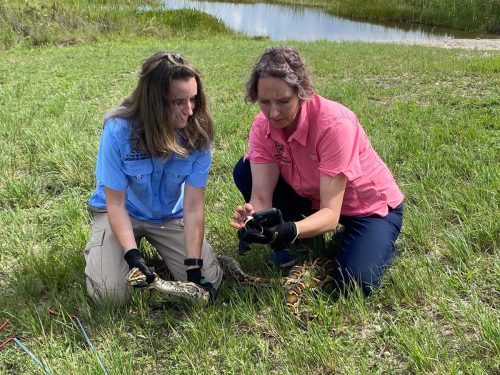
The 10-day Florida Python Challenge was created by the Florida Fish and Wildlife Conservation Commission (FWC) to increase awareness of invasive pythons and their negative impacts on Florida's ecology, per a Sept. 15 press release.
"Removing these invasive pythons is an important part of our efforts to protect the Everglades, and this competition allows people to get involved in Florida's conservation efforts for one of the world's most prized natural resources," Florida Lieutenant Governor Jeanette Nuñez said in the release.
Approximately 1,050 people from 35 states and Belgium participated in the 2023 event, with winners announced at an awards ceremony in Davie, Florida.
This year's winner, Paul Hobbs, removed 20 Burmese pythons from South Florida, claiming the $10,000 Ultimate Grand Prize, per the press release. The runner-up, Ronald Kiger, removed 14 pythons and took home $7,500. In the separate Military category, Justin Morgan claimed the top spot, removing seven pythons and taking home $2,500 in prize money.
However, these 41 pythons collected by the winners are only a portion of the 209 that were removed.
"I thank everyone involved in making the Florida Python Challenge® a successful event year after year, and I congratulate the winners of this year's competition," Nuñez said.
RELATED: 17-Year-Old Bitten by Rattlesnake in His Home—Where It Was Hiding.
Burmese pythons directly threaten ecosystems and human safety.
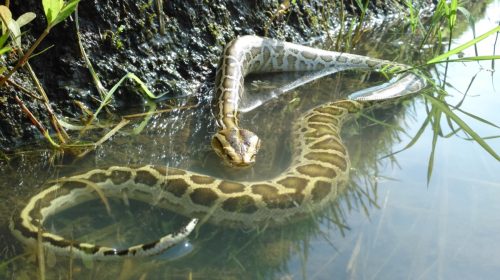
According to the Florida FWC, the Burmese python is one of the largest snakes on Earth, and adult pythons caught in Florida average between six and nine feet long. Previously, the longest ever found was a whopping 18 feet, but this summer, local hunters in Big Cypress National Preserve set a new record when they caught a 19-foot Burmese python.
The snakes, which are native to Southeast Asia, prey on mammals, birds, and reptiles (including alligators)—and they can also pose a threat to human safety and prey on pets, specifically cats and dogs, according to the FWC.
Because of these concerns, controlling these animals is a "high priority." The FWC notes specific initiatives to remove the snakes, including contractor surveys and python removals, python patrol training, the annual Florida Python Challenge, and the FWC's support of "innovative research to improve our ability to detect and remove pythons."
But while there are control methods in place, Florida is unlikely to ever rid itself of these apex predators.
RELATED: 24 Invasive Pythons Found in the U.S. in One Month.
It's probably not possible to get rid of Burmese pythons completely.
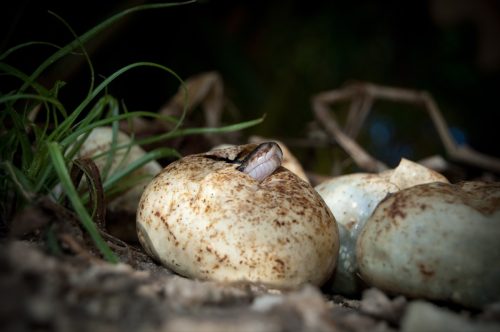
According to the U.S. Geological Survey (USGS), "the odds of eradicating an introduced population of reptiles once it has spread across a large area are very low." Per the agency's estimates, the Burmese python has infiltrated over 1,000 square miles of South Florida, meaning "the chances of eliminating the snake completely from the region is low."
In fact, in a USGS report from February, the agency said these snakes present "one of the most challenging invasive species management issues worldwide."
The agency adds that this is why prevention, early detection, and rapid response are so vital. But making things even more complicated, Burmese pythons are now making their way north.
RELATED: Giraffe-Sized Python Found in the U.S.—Why They're Unstoppable.
They're already on the move.
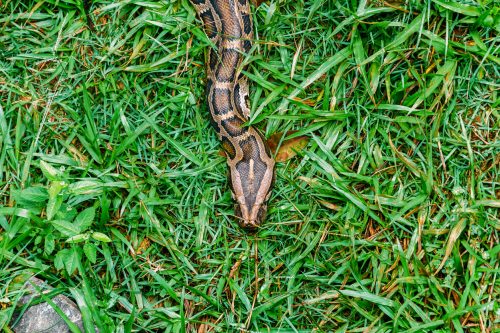
Speaking with Insider, Ian Bartoszek, a biologist with the Conservancy of Southwest Florida, explained that Burmese pythons aren't content with staying in South Florida.
"We're just seeing them show up in counties further and further to the north," Bartoszek told the outlet.
In fact, when a snake was tagged with a radio transmitter, researchers found that it could travel up to one mile each day; since the 1990s, these pythons have spread over 100 miles from the southernmost area of the state.
It's not clear whether Burmese pythons are spreading due to people releasing their pets into the wild (they first got to the U.S. as part of the pet trade) or if wild populations are migrating, Insider reported. It's also unclear how far north they've made it, but current research notes that they have at least arrived at Lake Okeechobee, which is near West Palm Beach on the eastern coast of Florida.
However, models predict that they won't stop there—and Burmese pythons could make it all the way to the Pacific Northwest, infiltrating Oregon, Washington, and Idaho. This would take decades, but canals and deep-water levees "could act as a bit of a python highway," Melissa Miller, PhD, a scientist who specializes in invasive species research, told Insider. In addition, pythons that survived a cold spell in Florida in 2010 may have adapted to surviving colder temperatures in the north.
RELATED: For more up-to-date information, sign up for our daily newsletter.
- Source: https://myfwc.com/news/all-news/python-challenge/
- Source: https://myfwc.com/wildlifehabitats/profiles/reptiles/snakes/burmese-python/
- Source: https://www.invasivespeciesinfo.gov/terrestrial/vertebrates/burmese-python
- Source: https://www.usgs.gov/faqs/can-invasive-pythons-be-eradicated
- Source: https://www.usgs.gov/centers/wetland-and-aquatic-research-center/news/comprehensive-review-burmese-python-science
